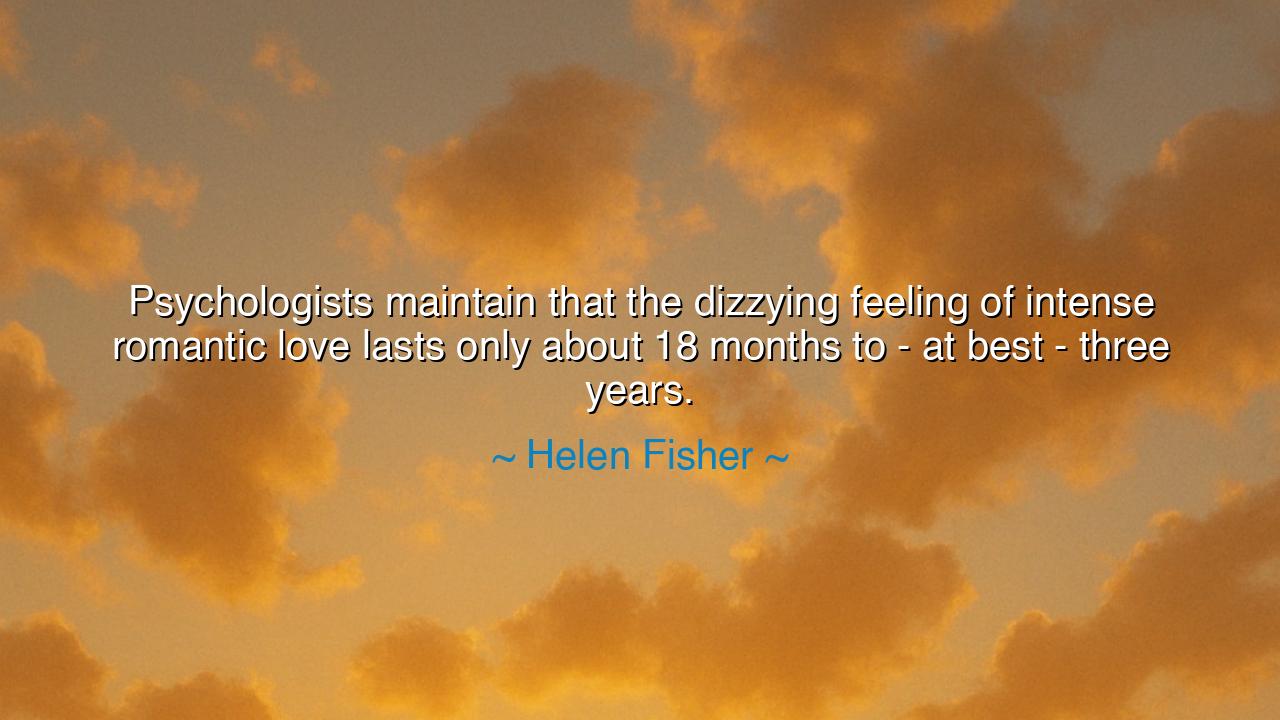
Psychologists maintain that the dizzying feeling of intense
Psychologists maintain that the dizzying feeling of intense romantic love lasts only about 18 months to - at best - three years.






The words of Helen Fisher—“Psychologists maintain that the dizzying feeling of intense romantic love lasts only about 18 months to—at best—three years.”—strike like a bell, clear and sobering. She speaks not from whim or fancy, but from the findings of science, unveiling a truth that many hearts resist: that the intoxicating fire of romantic love is not endless in its initial blaze. Its flames, so dizzying and all-consuming, are born of nature’s design, yet like all fires, they calm and settle into embers. This does not diminish love—it transforms it.
The dizzying feeling she names is that first madness of passion: the sleepless nights, the trembling hands, the rush of longing when the beloved draws near. It is a force celebrated by poets and singers, depicted in myths as arrows from Cupid or potions of enchantment. Yet Fisher reveals what the ancients hinted at: such ecstasy is not meant to last forever. It burns fiercely to bind two souls together, but cannot burn endlessly without consuming itself. Like the spring that bursts with flowers but yields to summer’s steadiness, so too does passion yield to deeper, quieter bonds.
This truth has ancient echoes. Consider Antony and Cleopatra, whose fiery passion shook empires. Their love was fierce, intoxicating, and legendary, but it burned with such force that it could not endure. Contrast this with Odysseus and Penelope: theirs was not a love of dizzying passion but of enduring faith, stretched across twenty years of absence. When he returned, their bond was not that of fleeting intoxication, but of a steady loyalty that had weathered the storms. In these two tales, we see the very truth Fisher describes: passion is brief, but devotion may endure for a lifetime.
The origin of this teaching lies in the biology of the brain. Scientists have found that the chemicals—dopamine, norepinephrine, serotonin—that surge during early passion cannot remain at fevered pitch forever. They fade, and in their place new chemicals, like oxytocin and vasopressin, build the bonds of attachment. The ancients described this change in myth and parable, but now psychology and neuroscience put names to the patterns. Passion is a spark; companionship is the flame that warms through the long night.
The meaning of Fisher’s words, then, is not despair, but wisdom. We are taught from youth by songs and stories that love should always feel like fire, that if the dizziness fades, the love must be broken. But this is false. The fading of passion’s madness is not the end of love, but its transformation. The first stage binds two together; the later stages teach patience, loyalty, sacrifice, and trust. What begins in fire may continue in stone, unshakable and enduring.
The lesson for us is to embrace the stages of love with reverence. Do not mourn when the dizzying passion fades, nor chase endlessly after new flames to recapture it. Instead, cherish the deeper bond that emerges, the quiet joy of companionship, the comfort of a hand that remains when storms have passed. Learn to see love not only as ecstasy, but as discipline, as choice, as daily devotion. For the greatest love stories are not those of brief passion, but those of steadfastness.
Practically, this means tending love as one tends a fire. Do not expect the blaze of kindling to last forever; instead, feed the embers with patience, attention, and kindness. Speak words of gratitude. Share burdens. Choose daily to honor the one you love. And when passion rises again, as it sometimes will, embrace it as a gift—but do not depend upon it as the only proof of love.
Thus, Helen Fisher’s words, though rooted in psychology, are wisdom for all ages. Romantic love in its fiery beginning is a blessing, but not its highest form. The greater love is what remains after the fire settles: steady, enduring, tested by time. Let us then not be deceived by the fleeting ecstasy of the early days, but strive for the love that becomes eternal through loyalty, sacrifice, and truth.






AAdministratorAdministrator
Welcome, honored guests. Please leave a comment, we will respond soon